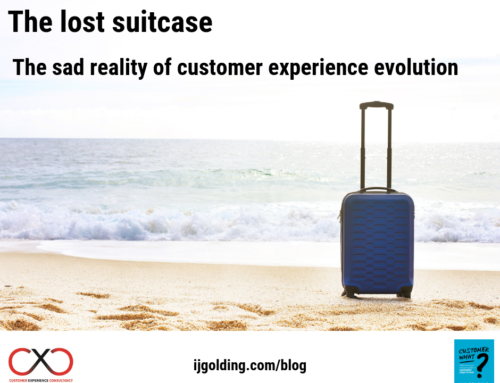
I am very fortunate to attend many conferences in the UK and around the world on all sorts of subjects. Obviously, I prefer to attend conferences where there is some interest in customer experience – there would not be much point in me going to a gynaecology summit now would there! As well as seeing some lovely places, and meeting very interesting people, I am also blessed with being able to listen to incredibly inspiring speakers. One such speaker inspired me last week at the Retail Conference in London.
Ryan Cheyne is the People Director from Pets at Home (PaH). I have been a customer of PaH ever since the Golding family became a family of 6 – when Rosie, our 4-year-old chocolate Labrador joined us. What Ryan confirmed for me is something I always suspected about the company which he works for and represents – that their people are so very important to them. Many organisations stand up and say how important their ‘team is’, but how many of them genuinely mean it? How many organisations honestly try to bring the right people together that have a shared passion and motivation to deliver the very essence of what their organisation stands for?
I believe that PaH is one of those organisations. Ryan told the audience last week that 93% of PaH employees are pet owners themselves. 93%!!! That is an amazing statistic – and one that is so significant to a company’s ability to deliver a consistent customer experience where the people really understand their customer. How many businesses are able to say that the overwhelming majority of their employee base can completely understand and empathise with their customers? Ryan showed the latest PaH TV advert – it just demonstrates how important it is to them that their people are like their customers. You can watch the video via this link – it is definitely worth it:
http://www.youtube.com/watch?v=owRneBw7dm4
If you own a rabbit and have a ‘technical’ question about it, it makes such a difference being able to walk into a shop and ask a member of staff who also owns one. Even if the staff member you meet is not a rabbit owner, it is very likely they will own something, greatly increasing their ability to understand where you are coming from. But it is not only staff understanding that benefits the customer. Someone who owns a pet who also works in a pet store, obviously is a big advocate of the store they work for. This makes a huge difference in the context of delivering great customer experiences.
I went into a PaH with my little boy Jack a few weeks ago. You cannot just go into a PaH with a little person and buy the thing you went in for. No! You also have to have a full tour of the shop to view all of the live creatures on show (the animals, not the staff!). One of the creatures Jack took a liking to was a ‘bearded dragon’ (or at least I think that is what he was). One of the staff members must have seen us admiring him, for a few minutes later, whilst we were looking at a guinea pig, this lovely man appeared behind us with the bearded dragon on his shoulder. I cannot remember his name, but the chap told us that he saw Jack looking at the bearded dragon, and he wondered if he would like to stroke him. How very simple – but what a brilliant customer experience. This employee (a bearded dragon owner himself), recognised what might excite and inspire his customers – young and old. His actions were not about generating revenue (at that instant), but his actions will ensure that not only do I keep recounting this story, I will also keep shopping at PaH.
Is it any wonder that PaH were second in the Sunday Times best big companies to work for in 2012 – http://features.thesundaytimes.co.uk/public/best100companies/live/template This is the summary used in the report:
STAFF THINK WORKING for Pets at Home is the cat’s whiskers. The retailer is certainly barking up the right tree in its bid to be the best pet shop in the world.
“I absolutely love my job,” says Annie Campbell, manager of the new Pets at Home store, which opened last December at Edinburgh’s Fort Kinnaird retail park. “The company’s brilliant. I cannot fault it,” adds Campbell, who has worked for the firm for 3½ years.
The pet care specialist, which ranked 77th in our mid-sized list last year, is now officially a big company after adding more than 500 new staff to the payroll, taking it past the 5,000 threshold. It snatches second place on its debut in the list of the Best Big Companies to Work For.
Workers like the relaxed, friendly atmosphere, lack of stress and the personal and professional development on offer, not to mention the animals and reptiles they work with. Depending on the size of the store, these can include fish, frogs, snakes, tarantulas, giant rabbits and chinchillas.
Or dogs, if the store has a groom room like the one at the Fort, where assistant stylist Amanda Cleghorn is enjoying a second career after being made redundant from her job as an IT manager. “I go home very satisfied,” says Cleghorn, who at times brings her two springer spaniels to work.
Pets at Home gets the highest score for encouraging charitable activities (87% positive) and ranks first for our Giving Something Back factor. The firm, which helped to rehome more than 50,000 animals last year, carries out school visits and sponsors the Cub Scout and Beaver animal carer/friend badges. Staff say Pets at Home makes an effort to protect the environment (76%) and makes a positive difference to the world (72%). Employees also report that they have fun with their colleagues (84%) and feel they have the support they need to provide a great service (78%).
Daily shoals (morning meetings) covering everything from sales figures to customer feedback serve to ensure that everyone is completely clear about what is expected of them at work (81%).
Staff receive comprehensive and ongoing training on subjects from health and safety, pet care and new products as well as specialist areas such as selling restricted medicines, dog and cat nutrition or even running puppy training courses.
Such training is of great benefit to employees personally (77%) and they feel their jobs are secure (82%). Both are top scores. Employees are excited about where the firm is going (74%), boosted, no doubt, by its increasing revenues, which reached almost £518m last year, and its policy of promoting from within.
“It is easier to bring our guys up through the ranks because they understand the business and culture,” says Garry Cousland, area manager with responsibility for 17 stores in Scotland, who started out as an assistant manager 17 years ago.
Almost half of the staff has worked for the firm for at least three years, including Ailsa Bogle, who started as a Saturday girl at the store in Wick and who is now on a student contract while studying in Edinburgh. Like her co-workers, Bogle is happy with her pay and benefits (65%). The average salary of a store colleague is £11,000 while half of the staff earns £7,500 or less, reflecting the fact that 52% of people work part-time.
Workers also get the day off on their birthday, staff discounts, extra wedding holiday and subsidised gym membership. Those who go the extra mile get thank-you notes and evenings out.
Bringing people who understand your business and who are like your customers will reap rewards – as PaH have discovered. Another well-known example of a company that believes 100% in bringing the right people into its business is Zappos – the US online retailer that is now owned by Amazon. The US magazine, America’s Best Companies, sums up it up brilliantly in their article, ‘Going Above and Beyond’ (http://www.americasbestcompanies.com/magazine/articles/going-above-and-beyond.aspx). If you do not want to read the full article, this paragraph sums it up:
You might ask yourself, “How do Zappos associates put such an emphasis on customer service?” The answer is that Zappos has come up with a creative way to hire employees and ensure their dedication to customer service through their training program. Zappos’ recruiting staff asks potential employees questions based on culture fit that is similar to a speed dating format. One of the questions that Zappos’ recruiting staff asks is: “On a scale of 1-10, how weird to do you think you are?” This is to get a sense of how well the potential employee will fit into Zappos’ unique culture. Zappos Core Value #3 is to “Create Fun and a Little Weirdness.” Zappos believes that without having some fun and a little weirdness, there would be a lack of exciting work culture. Potential employees who answer either 1 (not weird) or 10 (very weird) will not be hired, but those who can say they are weird have a better chance of being hired. “A potential employee could be the best technical person for the position, but if they are not a culture fit they [Zappos recruiting staff] will not hire them,” explained Judd.
Once hired, new Zappos employees go through a vigorous two-week training process. After this training process, Zappos presents their newly hired employees, “The Offer.” Zappos offers them $2,000 to quit right there on the spot. “Our ‘Offer’ shows that we have committed people who want to stay with the company and have passion for our drive for customer service,” she said. Although only 1-2 percent do take “The Offer,” it shows that all of the Zappos employees are dedicated to customer service and committed to their culture. The fun begins as soon as employees are immersed in Zappos culture. From various team-building activities, to American Idol in the cafeteria during lunch, Zappos truly brings the passion for dedication to customers and fun into one extraordinary company.

I used to work for an online retailer myself. The contact centre staff were very passionate, committed people. However, it was not always evident that they really understood the customers they were employed to serve. Sometimes it does not matter how committed to delivering a great experience you are, a woman may not want to order underwear over the telephone when the agent on the other end of the line is a young man! I have been consulting for a logistics company who is a major supplier of delivery services for eBay. This company is very committed to customer experience. The customer service director absolutely understands what is required. His problem is that the majority of his contact centre team do not use eBay. They do not understand what it feels like to be an eBay ‘trader’ and how important it is for the delivery to go to the right place at the right time. If the agent cannot empathise with the customer, how can they really help and placate that customer when it does not go to plan.
Understanding your customer – really understanding them – is an essential ingredient that makes good companies great. I am not suggesting that you all rush out and buy a pet – or that you start shopping with eBay. What I am suggesting is that you do ask yourself how well your employees know your customers. Do they or have they ever experienced what it feels like to be a customer of your organisation? If not, I strongly suggest you enable them to do so. It will make a huge difference – to them and your customers.
As always, I would be delighted if you want to comment on this or any of my blogs.






Hi Ian
Richard Quarterman here – you may remember me from the Customer Strategy work we did at Waitrose. Pets at Home was one of the case studies we looked at, and what I was impressed by was the integrity of their approach – simple, but consistent, they’re a business about pets, so they hire people who are passionate about pets. We try to do the same with food, but it’s a good overarching principle for any customer experience business – work out what you are passionate about, and then fill your organisation with people who share that passion.
Regards
Richard
Hi Richard – of course I remember. Thank you so much for responding to this – I will pass on your comments to Pets at Home – this is wonderful feedback from an organisation such as Waitrose. I hope all is going well with you and the wonderful expansion of Waitrose!
[…] How well do you know your customers and the story of a Bearded Dragon from Ian Golding […]